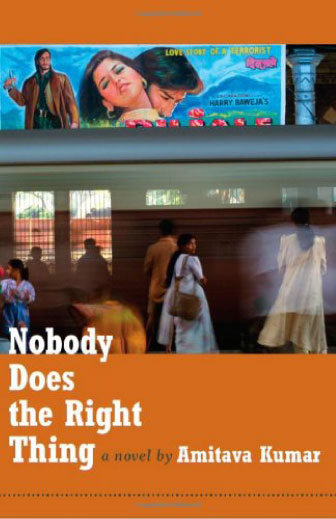“To know a country so you have its dirt beneath your fingernails is a difficult thing. ReadNobody Does the Right Thing and you will have India beneath your fingernails.”—Akhil Sharma, author of An Obedient Father
“Nobody Does the Right Thing is a deeply compassionate novel about art, life, and everything that lies in between.”—Laila Lalami, author of Secret Son
“Nobody Does the Right Thing imaginatively portrays the forces shaping contemporary India, and it is a remarkable reader of mass culture and popular narrative forms, of the worlds of Hindi cinema, pulp fiction, sensational journalism, and globalized media.”—Siddhartha Deb, author of An Outline of the Republic and The Point of Return
“Nobody Does the Right Thing is a quietly but deeply impressive novel. It not only takes us into the living, ambivalent textures of an India that is relatively little written about: the India of villages, highways, second-class train compartments, and old but second-rate metropolises. It also transforms itself, in the process, into an exemplar of how that variegated terrain might be addressed.”—Amit Chaudhuri, author of The Immortals
“The fact that Home Products has been written in conversation with Hindi literature is astonishing. I can think of no other English language novel that does this.” Chapati Mystery review
“If you’re willing to have Indian villages and metropolises and pop culture and politics become a small part of who you are, pick up a copy of “Nobody Does the Right Thing.” You’ll be the richer for it.” —Minneapolis Star Tribune
“ It’s a terrific novel, which I think will be challenging to many readers in the Indian subcontinent as well as the West, but many of the elements that make it challenging are also what make it great.” Sepia Mutiny review
Read the Barnes and Noble interview
The Big Indian Picture interview
Book Notes for the novel at Largehearted Boy
Kumar’s latest, distinctive novel looks at the multifaceted, interconnected lives of two cousins within the blurry terrain of personal ambition, class, and contemporary life. Following the murder of a young poet by her politician lover, a journalist, Binod, is hired by a Bollywood director to write a screenplay based on the events surrounding the controversial affair. Binod’s research brings him to Bihar, India, near the village where he was raised. This is also where his cousin, the larger-than-life Rabinder, is imprisoned after distributing pornography through his Internet café. While Binod struggles to begin writing the script, the past and present lives of other relatives become intertwined with his own, particularly those of his perceptive, dying father and Bua, Binod’s aunt and Rabinder’s mother, who breaks societal and political norms after her husband becomes mentally unstable. In the meantime, Rabinder concocts various get-rich-quick schemes and finally decides on filmmaking to pursue the commercial success he so desires. The shifts between rural communities and the urban sprawl of Delhi and Bombay heighten the contrasting perspectives in Kumar’s intelligent tale. –Leah Strauss, Booklist
Amitava Kumar’s essay,How to Write a Novel, The Hindu
